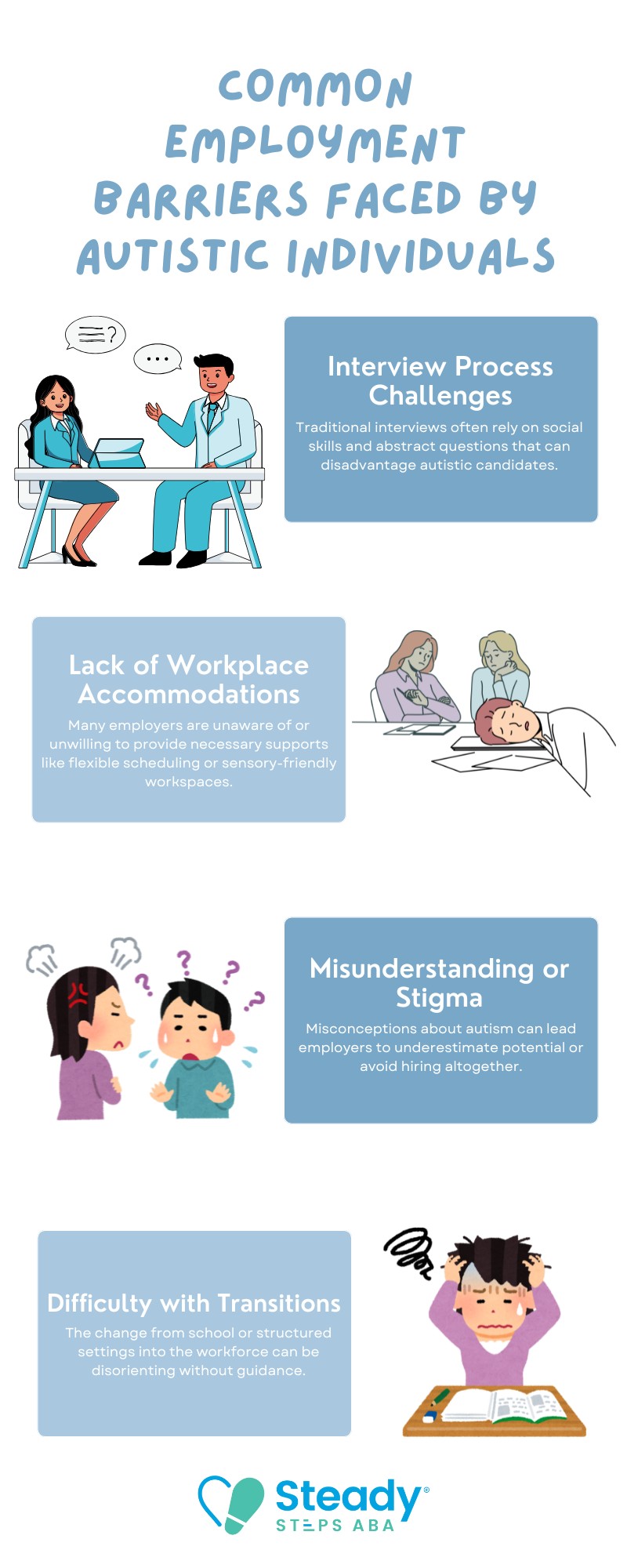Key Points:
- Employment for autistic individuals is possible and beneficial with proper supports, accommodations, and awareness.
- Many autistic adults have unique strengths that make them valuable contributors in the workplace.
- Transitioning from school to work often requires skill-building, job coaching, and structured programs.
Finding and maintaining employment for autistic individuals is both a challenge and a huge opportunity. Autistic adults often face barriers to employment, including communication differences, a lack of accommodations, or misconceptions about their abilities. Because of this, only 29% of autistic individuals in the United States report experiencing employment.
Despite this, many individuals with autism are highly capable and bring unique strengths, like attention to detail, honesty, and consistency, that make them valuable in the workplace. Understanding how to support autistic individuals on the path to employment is critical for families, educators, and employers.
What is Employment for Autistic Individuals?
Employment for autistic individuals refers to paid job opportunities that are accessible, supportive, and inclusive of their diverse needs, strengths, and communication styles. These can range from part-time roles to full-time careers, in competitive, supported, or customized work environments.
A meaningful job offers more than a paycheck. It provides a sense of purpose, independence, and social inclusion. For many autistic individuals, finding a job that suits their strengths and supports their challenges can significantly improve quality of life and long-term well-being.
What Barriers Do Autistic Adults Face in Employment?
Despite their capabilities, many autistic adults remain unemployed or underemployed. Some estimates show that the majority of autistic adults are either out of the workforce or working below their skill level. This gap often stems from multiple systemic and interpersonal challenges.
Common employment barriers include:

These barriers are not insurmountable. With the right interventions, job coaching, and employer education, more autistic individuals can thrive in a variety of roles.
What Strengths Do Autistic Individuals Bring to the Workplace?
Autistic individuals often bring valuable strengths to the workplace, including strong attention to detail, reliability, innovative thinking, and a high level of focus. Many excel in roles that require precision, pattern recognition, or technical expertise, making them assets in fields like technology, research, and design.
Their ability to think differently can lead to creative problem-solving and fresh perspectives on workplace challenges. Additionally, autistic employees are often highly dedicated and honest, contributing to a positive and trustworthy work culture. When supported with inclusive practices, their unique strengths can significantly enhance team performance and innovation—just as individualized support in education can unlock a student’s full potential, as explored in How to Set the Right IEP Goals for Autism Support.
What Types of Jobs are a Good Fit for Autistic Adults?
Autistic adults bring unique strengths to the workplace, including strong attention to detail, pattern recognition, reliability, and deep focus. When supported in the right environments, they can thrive in careers that match their skills and interests.
Here are five job types that are often a good fit:
1. Data-Focused Roles
Jobs like data entry, analysis, or quality control offer structured tasks and clear expectations, ideal for individuals who excel at detail-oriented work and repetitive processes.
2. Technology and IT Careers
Programming, software testing, or cybersecurity are great for those with strong logical thinking, pattern recognition, and the ability to focus for extended periods without distractions.
3. Creative and Artistic Work
Graphic design, animation, writing, or music composition allow autistic adults to express their creativity independently and often involve fewer social interactions or sensory demands.
4. Animal Care and Agriculture
Roles involving animals, farming, or horticulture are well-suited for individuals who prefer routine, physical activity, and less intense human interaction.
5. Skilled Trades and Manufacturing
Jobs such as carpentry, welding, or machine operation offer hands-on tasks with clear instructions, appealing to those who enjoy structure and working with tangible outcomes.
Creating inclusive workplaces ensures autistic adults have the opportunity to succeed using their unique talents.
How Can Families Support the Transition to Employment?
The shift from school to work can be challenging for autistic adults, but families play a vital role in easing this transition. With the right guidance and encouragement, families can help build confidence and practical skills.
Here are five key ways to offer support:
1. Start Early with Career Exploration
Encourage interests and expose your loved one to different career options during school years through volunteering, internships, or job shadowing experiences.
2. Build Daily Living and Workplace Skills
Help develop time management, communication, and hygiene habits—essential soft skills that boost workplace readiness and independence.
3. Connect with Vocational Services
Work with local or national agencies that offer job coaching, skills training, or supported employment programs tailored to autistic individuals.
4. Encourage Self-Advocacy
Teach your loved one to understand and communicate their needs, strengths, and accommodations so they can navigate the workplace more confidently.
5. Offer Emotional Support and Patience
Celebrate small wins, provide reassurance during setbacks, and maintain a positive outlook to reduce anxiety and boost motivation throughout the job search.
With consistent support and the right tools, families can empower autistic adults to find meaningful and fulfilling employment.

What are Supported Employment Services?
Supported employment services are designed to help individuals with disabilities, including autistic adults, find and maintain meaningful work. These services provide personalized assistance before, during, and after job placement, helping bridge the gap between employers and job seekers.
Autism supported employment services include:
1. Job Matching and Career Planning
Professionals work with individuals to assess their strengths, interests, and goals, then match them with jobs that suit their abilities and preferences.
2. On-the-Job Coaching
Job coaches provide hands-on training and guidance in the workplace, helping individuals learn tasks, adjust to routines, and build confidence in their roles.
3. Workplace Accommodations Support
Services include identifying and arranging reasonable accommodations, like modified schedules or communication tools, to create a more accessible work environment.
4. Ongoing Employment Support
Support doesn’t end after hiring. These services offer continued coaching, conflict resolution, and job retention strategies to ensure long-term success.
5. Employer Education and Advocacy
Providers also educate employers on autism inclusion and help create supportive, understanding workplaces that benefit both employees and organizations.
Supported employment services play a crucial role in helping autistic adults achieve independence and thrive in the workforce with the right support.
What Can Employers Do to Support Autistic Employees?
Employers can support autistic employees by creating an inclusive, flexible, and understanding work environment tailored to individual needs. This includes offering clear communication, sensory-friendly spaces, and accommodations such as flexible schedules or task modifications.
Providing autism awareness training for staff helps foster empathy and reduce stigma, while assigning mentors or job coaches can improve onboarding and long-term success. Encouraging open dialogue and focusing on strengths rather than challenges allows autistic employees to thrive and contribute meaningfully to the workplace.
How Can ABA Therapy Help Prepare for Employment?
ABA therapy can help prepare autistic individuals for employment by building essential skills such as communication, task completion, social interaction, and self-management. These skills are often critical for success in job settings and can be customized to match a person’s vocational goals.
Through structured teaching and reinforcement, ABA can target workplace-specific behaviors like following instructions, handling feedback, managing time, and interacting appropriately with coworkers. Therapists may also simulate job tasks or environments to help individuals practice and gain confidence. Over time, this preparation can increase independence, reduce anxiety, and improve overall job readiness.
Get the Support You Need with ABA Therapy
At Steady Steps ABA, we know how important it is to prepare for the future. For families exploring employment for autistic individuals, our team offers support through ABA therapy in Maryland, targeting vocational readiness, communication, and daily living skills.
We work collaboratively with families to create personalized goals that support independence and help bridge the gap between school and the workforce. Whether your child is preparing for their first job or learning how to navigate interviews, ABA therapy can be a powerful tool for long-term success.
Reach out to us to learn more about how our ABA therapy services can support your child’s journey toward meaningful, fulfilling employment.






